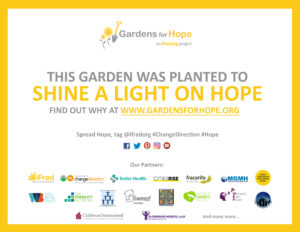This week has been rough in the news for me. REALLY rough. As everything I’ve been researching for years, with a team of global experts, is happening, and I’ve done everything in my power to prevent it and it has not been enough.
And that is a horrible feeling for me, makes me want to crawl up in a ball and go to sleep, and while some days I may allow it for a few hours, I get back up and get back to work.
I really don’t know how many lives we need to lose, how many articles I need to read, how many more studies we need to do, to prove that hope is key to this crisis. And that we must start young. I berate myself for not having an Ivy league degree, for not having succeeded at my 2nd product line to fund this work I know can have impact, for having been too caught up in my addictions to have started this earlier in life, for not having saved my dad so he could be here helping. On and on and on. As I really do wish I had done better. Worked harder. Been smarter with my money. Come home from school a day earlier. Yet rumination on that will get me one place only: in a deep, dark depression.

So by the grace of something much bigger than myself, I am reminded that each and every life I touch matters. It is as if when I reemerge to engage, and Angel on this earth offers some random tweet, e-mail, call or note. Full of wisdom. Today it was a teacher on twitter, @melanie_korach, that shared the story of the starfish. Check her out. She is a gift to the world.
And then, I remind myself what we teach about hope: We don’t start with a massive goal, feel the overwhelm, and give up. And even that is a relief. To know I don’t need to solve the entire hopelessness epidemic today. I don’t have to convince everyone that hope is critical to solving the mental health crisis. I don’t have to fix it all today.
Nope.
I just need to show up. Put one foot in front of the other, when I feel well enough to do so. And practice all we teach about Hope. That we can’t look at the mountain and give up. That we have to chunk down our goals and take them step by step. That we must eat well, sleep, exercise, meditate, be kind to ourselves and others, enjoy the journey, get in a positive mindset, and take care of our own mental health. As only from a place of peace can we really start to solve these challenges.
So today, I thought about one thing I could do. And right now, it is writing this blog. Maybe nobody will read it, yet I will never know, unless I try.

So back to the Gardens for Hope, and top 10 reason to consider getting out to plant and put up a sign:
10. Gardening is good for brain health. Studies reported a wide range of health outcomes, such as reductions in depression, anxiety, and body mass index, as well as increases in life satisfaction, quality of life, and sense of community.
9. Sunflowers are yellow, the color of joy, happiness, and hope; what we feel when are positively managing our mental health. Check out these fascinating facts.
8. Higher hope is associated with better academic performance, less stress, increased productivity, quality leadership, more resilience, lower anxiety, and better social connection. Isn’t that something we all want?
7. We united together with 16 other organizations to make it happen. They all have important messages, and work, they are doing in mental health. Check them out and support them.
6. Stigma is removed through awareness and education. You never know how one person, seeing one sign, can change a life.
5. It is kind. Kindess has so many benefits for mental health. Did you know?
4. Spreading hope combats hopelessness, which is associated with; weapon carrying at school, partner violence, economic insecurity, discrimination, addiction, depression, anxiety, suicide, loneliness, disrespect of self and others, delinquint behavior, sexual abuse, and so much more.
3. Read #4 again. Think about it. Really take a few minutes to consider. Think about how we react to crisises. School shootings. Immigration. Violence. Bullying. Suicide. What would it take to change our approach, and focus on prevention through teaching hope?
2. Research is showing what we knew, suicides of 10-14 year olds are increasing. That is why we focused on 7-10 year old children to start, and absolute critical age for youth. Hopelessness is a predictor of suicidality and loneliness.
Thanks so much for checking this out, and considering planting in your yard, community center, church, park, or anywhere else you can think to plant sunflowers. Help spread the word, plant more gardens, and shine a positive light on mental health for all.



